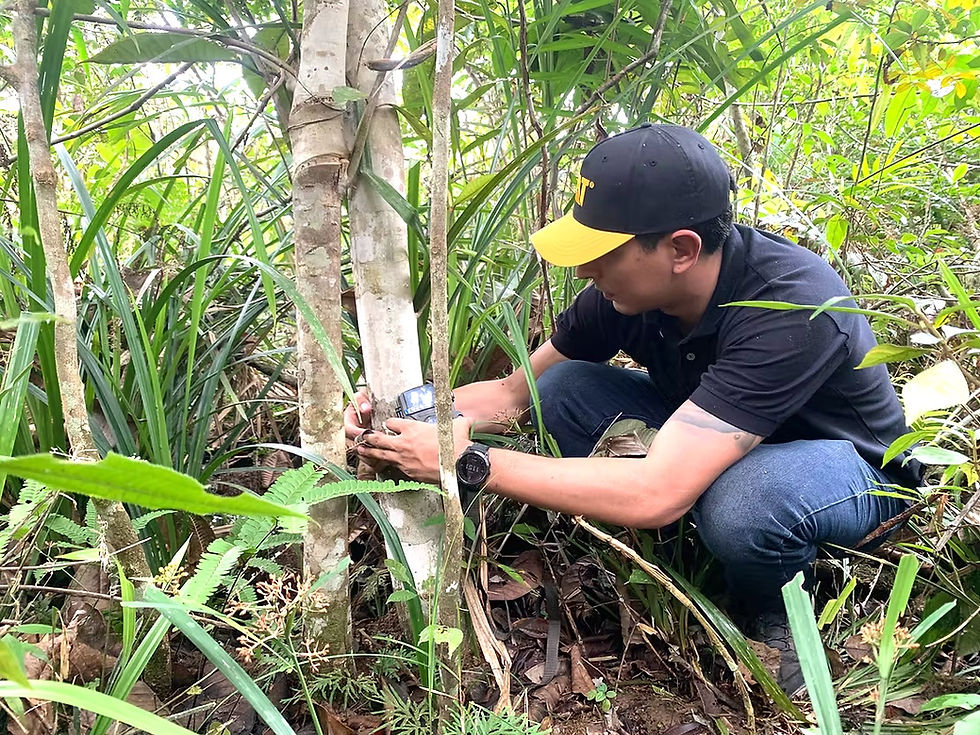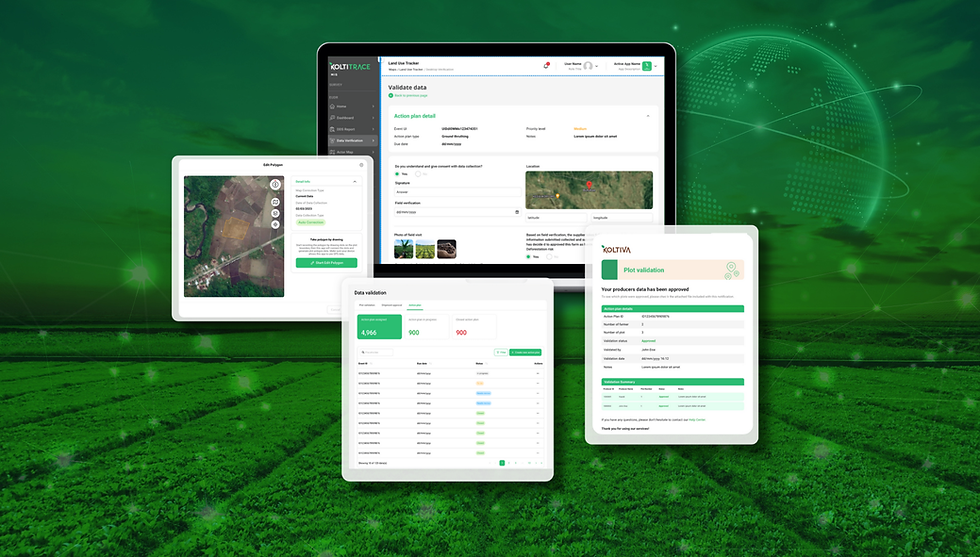Colombia’s Deforestation Surges 43%: Scaling Biodiversity-Driven Nature-based Solutions (NbS)
- Gusi Ayu Putri Chandrika Sari

- Aug 15
- 7 min read
Updated: 4 days ago
Editor’s Note:
This article was developed in collaboration with Felipe Usuga, our Senior Agronomy Officer for Latin America, drawing on his expertise in biodiversity conservation, traceability systems, and climate-smart agriculture. It highlights Colombia’s urgent deforestation challenges, the critical role of Nature-based Solutions (NbS) in reversing forest loss, and the market potential for biodiversity-linked commodities, illustrated through a case study of our work across the Amazon and tropical dry forests.
Executive Summaries
Colombia lost 113,608 hectares of forest in 2024, up 43% from 2023—driven by drought-fueled Amazon wildfires, land grabbing, and illicit crop expansion, reversing previous progress and threatening climate and biodiversity goals (The Straits Times, 2025).
Forestry and agriculture, contributing 7% to GDP and employing 16% of the workforce, have both a responsibility and a market opportunity to reverse deforestation through Nature-based Solutions (NbS) that restore ecosystems, protect watersheds, and sustain rural livelihoods (The Food and Land Use Coalition, 2023).
Koltiva is delivering a biodiversity-focused consultancy in Colombia to advance sustainable management of Non-Timber Forest Products (NTFPs) such as Açaí, Camu Camu, Copoazú, and Corozo, integrating digital traceability, biodiversity monitoring, and inclusive value chains to connect conservation, climate resilience, and market access.
Introduction – The Urgency for Nature-based Solutions in Colombia
Colombia is a megadiverse country with over 50% forest cover, 40% agricultural land and home to approximately 10% of Earth’s species (The Food and Land Use Coalition, 2023) and it has lost millions of hectares of tree cover in recent decades. According to the Country's Environment Ministry, as reported by The Straits Times, deforestation surged in 2024, rising 43% from the previous year. (The Straits Times, 2025).
An estimated 113,608 hectares of forest were destroyed, largely in the Amazon region, driven partly by drought-fueled forest fires linked to climate change. Other major drivers included land grabbing for pastures, expanding livestock farming, building illegal roads, and cultivating illicit crops such as coca leaves. This marks a sharp reversal from 2023, when forest loss fell 36% to its lowest level in 23 years at 79,256 hectares.
This rapid deforestation is eroding biodiversity, depleting water sources, and threatening the livelihoods of rural communities. The forestry and agriculture sectors, which together contribute 7% of Colombia's GDP and employ 16% of the workforce, have both a responsibility and an opportunity to help reverse this trend through Nature-based Solutions (NbS).
The path forward is urgent yet clear: NbS can restore forests, regenerate soils, and protect watersheds while creating sustainable economic opportunities. By pairing ecological restoration with traceable, regenerative agriculture, Colombia can safeguard its natural capital, meet its climate commitments, and secure market access for deforestation-free commodities.

Table of Index:
Why Nature-based Solutions Matter for Colombia
Defining NbS
Nature-Based Solutions (NbS) are interventions that harness the power of ecosystems to address climate change and deliver co-benefits for biodiversity, livelihoods, and resilience. They reduce greenhouse gas (GHG) emissions, restore degraded landscapes, and empower local communities, making them a cornerstone of the transformation agenda for food and land use systems. In agriculture, NbS can boost on-farm biodiversity, enhance productivity in both crop and livestock systems, and increase the availability of nutritionally diverse food.
Colombia’s NDC Commitments
Colombia has signaled strong commitment to NbS, joining the Global Alliance for NbS and embedding them into national policy frameworks such as its Nationally Determined Contribution (NDC). The NDC outlines concrete targets for ecosystem restoration and conservation, aiming for a 51% reduction in emissions by 2030. According to The Food and Land Use Coalition (2023), Colombia is implementing ambitious initiatives to meet this goal.
The Climate Mitigation Potential
If fully implemented, a comprehensive portfolio of land-based NbS could, by 2050, deliver around 340 million tCO₂e in annual climate mitigation, which is roughly four times Colombia’s total emissions in 2019. These actions would also strengthen biodiversity protection, improve food and nutrition security, and enhance livelihoods across rural communities.
However, achieving these targets requires more than legislation. It requires field-ready, scalable, and inclusive solutions that translate policy ambitions into real change, with on-the-ground, in forests, and across fragmented supply chains. These solutions not only help meet national climate targets but also pave the way for inclusive green growth rooted in biodiversity conservation and sustainable land use.
The Role of Traceability in Scaling NbS with KOLTIVA
Why Data Integrity Matters
As NbS gain recognition for their role in tackling both climate and biodiversity crises, building knowledge of emerging climate finance and nature-based market mechanisms becomes essential.
“One of the key elements is understanding that standards and monitoring tools play a vital role in enabling smallholder producers to access these markets. In biodiversity markets, measuring impact remains a challenge, with different standards applying varying methodologies. This is why it is essential to first define the conservation objectives before selecting the most appropriate measurement approach,” explained Felipe Usuga, our Senior Agronomy Officer for Latin America, sharing insights from the Biodiversity Standard workshop, led by Biocarbon Standard during the Colombia Carbon Forum in April 2025, Bogotá.
Felipe emphasized that one of the forum’s most valuable lessons was how various monitoring tools strengthen certification schemes. While many project developers still create their own baseline scenarios, new trends are increasing the accuracy and transparency of assessments, reducing the overestimation of carbon credits and discouraging poor market practices.
Traceability is central to ensuring the credibility of NbS and biodiversity-linked commodities. Without robust data, market actors cannot validate carbon sequestration, verify biodiversity gains, or substantiate deforestation-free claims.
Koltiva’s Digital Traceability Tools & Solutions
As a leading Agritech and Climatech company, Koltiva is building robust capabilities to deliver solutions for a wide range of nature-based initiatives, from carbon markets and sustainable agriculture to biodiversity-focused mechanisms. Our expertise in supply chain traceability, combined with advanced digital tools, positions Koltiva as a trusted partner in tracking climate and nature-related actions. Through solutions like the following:
Koltitrace Land Use Tracker: classifies forest areas and assesses deforestation risks with advanced algorithms.
Agricarbon Tracker: estimates carbon sequestration in biomass using remote sensing.
KoltiSkills: supports feasibility assessments and compliance with biodiversity and carbon certification standards.
This technology infrastructure ensures NbS projects meet international standards, providing credible data for climate finance and biodiversity markets.
In line with the lessons learned, Felipe said, “Koltiva offers the Koltitrace Land Use Tracker, which enables the classification of forest areas and deforestation risk assessment using advanced algorithms. We are also enhancing Agricarbon Tracker, our tool for estimating carbon sequestration in biomass through remote sensing technologies."
Another key takeaway is the value of tailored solutions such as KoltiSkills, which supports clients in conducting feasibility assessments for nature-based projects. By gathering precise, relevant data, we help ensure compliance with diverse certification standards. Our platforms can be customized to monitor and evaluate critical indicators for both carbon and biodiversity projects.
Case Study: Advancing a Biodiversity-Focused Consultancy Project in Colombia

In Colombia, we are delivering a biodiversity-focused consultancy project through KoltiSkills that advances the sustainable management of Non-Timber Forest Products (NTFPs) such as açaí, camu camu, copoazú, and corozo. Harvested by rural and Indigenous communities from the Amazon and tropical dry forests, which are rich in biodiversity yet highly vulnerable to deforestation, these products provide both ecological and economic value.
Our work focuses on creating a roadmap to facilitate access to biodiversity markets as part of a long-term sustainability strategy for managing NTFPs. The project spans the Amazon region and tropical dry forests, where we are evaluating and piloting the most effective traceability systems for NTFPs produced on a commercial scale. These systems cover the entire supply chain, from producers and collectors to processing centers, ensuring that biodiversity conservation standards are embedded at every stage.
Insights from standards such as Verra, Biocarbon, and Cercarbono have shaped the methodology design, each offering different measurement approaches. Given that biodiversity project development in the region is still in the early stages of validation, establishing robust baselines and protocols now will be critical for future market readiness.
Through our Koltiskills service, field agents and biodiversity experts are working directly with cooperating entities and producer associations to build accurate biodiversity baselines for these NTFPs.

We help our client take critical steps in:
Technical Assistance, Traceability & Biodiversity Monitoring
Support sustainable management of NTFPs (açaí, camu camu, copoazú, and corozo) in key deforestation areas. Implement systems for real-time traceability and biodiversity monitoring, ensuring conservation efforts align with climate resilience strategies.
Community Involvement & Capacity Building
Incorporate local technicians, raise awareness about climate adaptation and biodiversity conservation, and ensure active participation of women, youth, and vulnerable populations in sustainable supply chains.
Market Access & Sustainability
Develop and validate market access protocols, including quality standards, certifications, and regulatory compliance. Evaluate and pilot the most suitable traceability systems for commercially produced NTFPs in the Colombian Amazon and tropical dry forests, covering producers, collectors, and processing centers. These systems are implemented across the entire supply chain, from harvesting to end consumers, ensuring biodiversity conservation criteria are met.
Biodiversity Characterization & Restoration
Conduct in-depth biodiversity analyses in NTFP production areas, assessing climate change impacts and conservation needs. Align activities with other restoration initiatives, agroforestry projects, and biodiversity-related financing mechanisms, including biodiversity credit schemes.
Gender & Social Inclusion (GESI) Focus
Develop GESI-aligned standards for traceability and supply chain design, and integrate gender-equitable, socially inclusive practices into biodiversity conservation strategies. Promote inclusive business opportunities that strengthen both social and environmental sustainability.
By combining field-level engagement with digital traceability solutions, Koltiva is helping Colombia’s NTFP sector evolve into a model of inclusive green growth—where biodiversity conservation, climate resilience, and community prosperity advance together
Conclusion – Turning Policy into Measurable Impact
“This work not only supports biodiversity conservation but also strengthens the economic resilience of smallholder producers managing forest resources sustainably,” conclude Felipe.
As biodiversity and carbon markets evolve, Colombia has the opportunity to lead in NbS-powered sustainable trade. The combination of ecological restoration, traceable supply chains, and inclusive community participation offers a clear path to reversing deforestation while unlocking new economic opportunities.
Initiatives like these will be critical for turning global commitments into local action. By combining technical expertise, inclusive value chains, and scalable technology, Koltiva is helping bridge the gap between policy ambition and practical implementation.
Ready to bring your sustainability project to life?
Author: Gusi Ayu Putri Chandrika Sari, Sustainable Communications Specialist
Subject Expert Matters: Felipe Usuga, Senior Agronomy Officer for Latin America at Koltiva
About the Expert:
Forestry Engineer with a Master’s in Science, Technology, and Innovation Management, specialized in Nature-based Solutions, sustainable agriculture, and carbon markets. With international experience across Latin America, leading technical and strategic projects on biodiversity conservation, agroforestry design, forest monitoring, and climate-smart land use. In Koltiva, support the Americas Market in developing and adapting content related agronomy issues, sustainability practices, supply chain analysis, NbS, and EUDR risk analysis for LATAM countries.
Resources:
The Straits Times. (2025, July 31). Colombia deforestation surges 43% fuelled by fires, land-grabbing. http://www.straitstimes.com/world/colombia-deforestation-surges-43-fuelled-by-fires-land-grabbing
Food and Land Use Coalition. (2023, August 31). Prosperous land, prosperous people: Scaling finance for nature-based solutions in Colombia. https://www.foodandlandusecoalition.org/wp-content/uploads/2023/08/FOLU-Financing-NbS-Colombi-report-key-messages-August-2023.pdf#:~:text=%E2%80%A2%20Colombia%20comprises%20over%2050,the%20economy%2C%20making%20up%207


















Comments